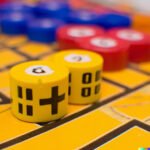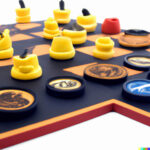Classic puzzle board games have a timeless appeal that has captivated players of all ages for generations. From ancient civilizations to modern adaptations, these games have evolved and adapted throughout history while still maintaining their popularity. Whether you’re a beginner looking to explore the world of puzzle board games or an experienced player seeking new challenges, there is a game out there for you.
These games offer not only entertainment but also educational benefits, social bonding opportunities, and nostalgic trips down memory lane. In this article, we will delve into the enduring charm and appeal of classic puzzle board games, exploring their origins, gameplay mechanics, strategies, and more. So gather your family and friends as we embark on a journey through the wonderful world of classic puzzle board games.
Evolution of Classic Puzzle Board Games
Classic puzzle board games have a rich history that spans across ancient civilizations to modern adaptations. These games have evolved and adapted throughout the years, yet their enduring appeal remains constant. By tracing their origins back to early civilizations, we can appreciate how these games have transformed over time.
One of the earliest examples of a classic puzzle board game can be traced back to ancient Egypt with the game of Senet. This game was played on a grid-like board and required players to strategically move their pieces along the spaces. Similarly, ancient China had its own puzzle board game called Go, which has withstood the test of time and is still played today.
As time went on, puzzle board games continued to evolve and adapt as different cultures added their own unique elements and rules. For example, Chess originated in India but became popularized in Europe during the Middle Ages. In contrast, the game of Mahjong emerged in China during the Qing dynasty and quickly spread throughout Asia.
In more recent times, classic puzzle board games have seen modern adaptations that cater to contemporary interests and trends. Games like Catan incorporate elements of strategy and resource management, appealing to a wide audience of players. Additionally, cooperative puzzle board games like Pandemic have gained popularity by emphasizing teamwork and problem-solving.
Throughout history, classic puzzle board games have remained timeless due to their ability to captivate players of all ages. Whether it’s through historical games that teach us about ancient civilizations or modern adaptations that tap into our love for strategy and cooperation, these games continue to bring joy and entertainment to generations old and new.
Examples
- Senet: Originating from ancient Egypt, this game features a grid-like board where players strategically move their pieces along spaces.
- Chess: With its origins in India but popularized in Europe during the Middle Ages, this strategic game has become an international sensation.
- Go: An ancient Chinese puzzle board game that continues to be enjoyed today, requiring players to strategically place stones on a grid.
- Mahjong: Originating in China during the Qing dynasty, this popular tile-based game has spread throughout Asia and gained international recognition.
- Catan: A modern adaptation of puzzle board games, this game incorporates strategy and resource management in a dynamic and competitive environment.
- Pandemic: This cooperative puzzle board game tasks players with containing infectious diseases and saving humanity by working together.
The evolution of classic puzzle board games from their ancient origins to the present day showcases their timeless appeal. With their ability to adapt and capture the interests of players across different generations, these games have truly stood the test of time. From historical games that teach us about ancient civilizations to modern adaptations that cater to our love for strategy and cooperation, classic puzzle board games continue to bring joy and entertainment to people of all ages.
Must-Have Classic Puzzle Board Games for Beginners
Introduction: Classic puzzle board games have held a timeless appeal for generations, captivating players of all ages. These games offer a perfect blend of entertainment, challenge, and skill development. Whether you’re just starting out or looking to expand your collection, here are some must-have classic puzzle board games that are perfect for beginners.
Jigsaw Puzzles
Jigsaw puzzles are a staple in any puzzle enthusiast’s collection. They consist of various interlocking pieces that need to be assembled to form a complete picture or design. These puzzles come in different difficulty levels and themes, making them ideal for beginners of all ages. Jigsaw puzzles can provide hours of relaxation and cognitive stimulation as you try to fit the pieces together.
Scrabble
If you love words and strategic thinking, Scrabble is the game for you. Players take turns placing letter tiles on a game board to form words and score points based on the letters’ values and placement. This classic puzzle board game encourages vocabulary expansion, critical thinking, and strategic planning. It offers endless possibilities for word creation while challenging players to make the most out of limited letter resources.
Sudoku
Sudoku is a logic-based number-placement puzzle that has gained worldwide popularity in recent years. The objective is to fill a 9×9 grid with digits so that each column, each row, and each 3×3 sub-grid contains all the numbers from 1 to 9 without repetition. Sudoku puzzles come in varying difficulty levels from easy to expert, allowing beginners to gradually improve their problem-solving and logical reasoning skills.
These must-have classic puzzle board games are perfect options for beginners looking to dip their toes into the world of puzzling fun. Each game offers its own unique challenges and benefits while providing endless hours of entertainment. So gather your family and friends, pick up a game, and embark on new puzzle-solving adventures together.
Advanced Classic Puzzle Board Games for Seasoned Players
There are a variety of classic puzzle board games that are perfect for seasoned players looking for a challenge. These advanced games often require complex strategies and tactics to master, making them ideal for those who have already honed their skills in puzzle solving. Here is a selection of must-have advanced classic puzzle board games for experienced players:
- Chess: Chess is undoubtedly one of the most well-known and challenging strategic board games. It requires players to strategize multiple moves ahead, considering various possibilities and counter-moves. The objective is to capture the opponent’s king while protecting your own. With different pieces with unique movements and the opportunity for creative gameplay, chess offers limitless possibilities for strategic thinking.
- Go: Originating from ancient China, Go is considered one of the oldest board games in existence. While simple rules govern play, mastering Go requires incredible depth of strategy and decision-making skills. Players take turns placing stones on a grid, aiming to surround more territory than their opponent. The game’s complexity lies in its seemingly endless branches and options, necessitating foresight and long-term planning.
- Bridge: Bridge is a partnership-based trick-taking card game that demands careful communication between teammates while outsmarting opponents at every step. It involves bidding systems, where players bid on the number of tricks they believe they can win with their cards’ strength and suit distribution knowledge. Deciding when to bid aggressively or cautiously adds an extra layer of complexity to the game.
These advanced classic puzzle board games provide hours of stimulating gameplay for seasoned players looking for a mental challenge. With their intricate strategies and nuanced mechanics, these games offer endless opportunities to improve and refine one’s problem-solving abilities while engaging in competitive play.
Advantages
- Enhances critical thinking skills
- Develops strategic planning abilities
- Increases cognitive agility
- Offers a satisfying challenge for experienced players
Disadvantages
- Steep learning curve for beginners
- Requires time and dedication to master
- Potential for intense competition and pressure
- May not appeal to casual gamers seeking lighter gameplay experiences
Overall, advanced classic puzzle board games are designed to push the limits of players’ skills and provide a rewarding experience. From the strategic depths of chess to the historical significance of Go and the intricate teamwork required in Bridge, these games offer an intellectual challenge that keeps seasoned players engaged and entertained.
Classic Puzzle Board Games for Family Bonding and Social Gatherings
Classic puzzle board games have long been a source of fun and entertainment for families and friends. These games not only provide hours of enjoyment but also offer a great way to bond with loved ones and create lasting memories. Whether gathering around the dining table or enjoying a cozy evening at home, classic puzzle board games can bring people together in a unique way.
One popular game that is ideal for family bonding is “Scrabble.” This word-building game challenges players to create words from letter tiles and strategically place them on the game board to earn points. Not only does “Scrabble” encourage creativity and vocabulary skills, but it also promotes friendly competition as players try to outscore each other. Additionally, the game can accommodate multiple players, making it perfect for large gatherings.
Another classic puzzle board game that is well-suited for group play is “Monopoly.” This iconic game is all about buying, selling, and trading properties in order to bankrupt opponents and become the wealthiest player. With its strategic gameplay and negotiation opportunities, “Monopoly” offers a chance for families and friends to engage in lively banter while trying to dominate the real estate market.
For those looking for a cooperative gaming experience, “Pandemic” is an excellent choice. In this game, players work together as a team to prevent the outbreak of diseases across the globe. Each player takes on a different role with unique abilities, fostering collaboration and communication among team members. “Pandemic” encourages players to strategize together, making it an engaging option for social gatherings.
| Game | Number of Players | Mechanics |
|---|---|---|
| Scrabble | 2-4 | Word building |
| Monopoly | 2-6 | Negotiation, economics |
| Pandemic | 2-4 | Cooperative strategy |
In addition to fostering social interaction, classic puzzle board games also provide an opportunity for families and friends to disconnect from digital devices and engage in face-to-face interactions. Without the distractions of screens and notifications, players can focus on the game at hand while enjoying each other’s company. Classic puzzle board games encourage laughter, conversation, and friendly competition, creating a joyful atmosphere for all involved.
As technology continues to advance, it is important to cherish these traditional forms of entertainment that promote social bonding. Classic puzzle board games offer a break from screens and bring people together in a simple yet meaningful way.
Whether it’s the excitement of building words in “Scrabble,” the thrill of acquiring properties in “Monopoly,” or the collaborative effort in battling diseases in “Pandemic,” these games have a timeless appeal that transcends generations and provide lasting memories for families and friends.
Classic Puzzle Board Games with Educational Benefits
Classic puzzle board games not only provide hours of entertainment, but they also offer numerous educational benefits. These games can enhance cognitive skills, critical thinking, and problem-solving abilities in players of all ages. Whether you’re a student looking to strengthen your mental abilities or an adult seeking to keep your mind sharp, these puzzle board games can be valuable educational tools.
Enhancing Cognitive Skills
One of the main educational benefits of classic puzzle board games is their ability to enhance cognitive skills. Games like chess, for example, require players to think several moves ahead and analyze different scenarios. This mental exercise helps improve memory, concentration, and strategic thinking. Sudoku is another popular puzzle game that stimulates logic and reasoning skills. By solving number puzzles and patterns, players develop their ability to analyze information and make logical deductions.
Cultivating Critical Thinking
Classic puzzle board games are also effective at cultivating critical thinking skills. Games like Scrabble challenge players to form words using limited resources and strategic placement on the board. This forces players to evaluate various word options while considering point values and maximizing scoring opportunities. Similarly, Jigsaw puzzles require logical thinking as players must determine which pieces fit together based on visual cues. This promotes spatial awareness and problem-solving.
Developing Problem-Solving Abilities
Furthermore, classic puzzle board games are particularly beneficial for developing problem-solving abilities. Games like Clue immerse players in a mystery where they must use deductive reasoning to solve a crime. This requires analyzing clues, eliminating possibilities, and formulating hypotheses based on available information – all key components of effective problem-solving. Similarly, Rubik’s Cube presents a complex mechanical puzzle that challenges players to manipulate its colored squares into alignment by employing logic and creativity.
Rediscovering Nostalgic Favorites
Nostalgia can be a powerful force, especially when it comes to classic puzzle board games. Many individuals are drawn to these games for their ability to transport them back in time, evoking memories of childhood and simpler days. In this section, we will take a nostalgic trip down memory lane as we revisit beloved puzzle board games from previous decades.
Classic puzzle board games have had a profound cultural significance and impact on past generations. These games were often a staple in households, providing hours of entertainment and fostering social interaction among family members and friends. From the iconic Rubik’s Cube of the 1980s to the brain-teasing challenges of Clue and Scrabble, each game has its own unique charm that continues to captivate players today.
To delve into the rich history of these classics, one must first examine their origins. For example, chess traces its roots back to ancient civilizations such as India and Persia, while Chinese Checkers originated in Germany under a different name. Recognizing the historical context behind each game adds depth and appreciation for their enduring appeal.
| Puzzle Board Game | Decade Released |
|---|---|
| Rubik’s Cube | 1980s |
| Clue | 1940s |
| Scrabble | 1930s |
Digital Era
With the advancement of technology, classic puzzle board games have made a successful transition into the digital era. Many popular titles can now be enjoyed in virtual formats, allowing players to experience their favorite games on various digital platforms. This shift has opened up new possibilities for puzzle enthusiasts and introduced these timeless classics to a whole new generation of players.
Virtual adaptations of classic puzzle board games offer several advantages over their physical counterparts. Firstly, they provide convenience and accessibility, as players can enjoy these games anytime and anywhere with an internet connection. The virtual versions also eliminate the need for setting up physical game boards and managing pieces, making gameplay smoother and more streamlined.
Furthermore, digital adaptations often come with additional features and enhancements that enhance the overall gaming experience. These may include interactive tutorials, customizable difficulty settings, multiplayer modes for online play, and even the option to play against artificial intelligence opponents. Such features not only make the games more engaging but also cater to different skill levels, ensuring that players of all expertise can find enjoyment.
However, playing classic puzzle board games in the virtual world does have its drawbacks. Some enthusiasts argue that nothing beats the tactile experience and social interaction that comes from physically gathering around a game board with friends or family. Additionally, some players may prefer the tangible satisfaction of moving physical game pieces rather than manipulating pixels on a screen.
Regardless of these differences, there is no denying the popularity and success of classic puzzle board games in the virtual world. Through online platforms and mobile applications, people from all walks of life can now easily access their favorite titles like Sudoku, crossword puzzles, jigsaw puzzles, Mahjongg solitaire, and many others with just a few taps or clicks. The virtual availability of these beloved games ensures their longevity in today’s ever-evolving gaming landscape.
As technology continues to advance further, it will be interesting to see how classic puzzle board games will continue to evolve in the digital realm. With each new adaptation and innovation, these games will undoubtedly find new ways to captivate and entertain players in the years to come.
Tips and Strategies for Mastering Classic Puzzle Board Games
Mastering classic puzzle board games requires a combination of skill, strategy, and practice. While luck may play a role in some games, having a solid understanding of the game mechanics and implementing effective strategies can significantly increase your chances of success. Here are some tips and strategies to help you improve your gameplay and become a master of classic puzzle board games.
- Study the Rules: Before diving into any new game, take the time to thoroughly read and understand the rules. Each game has its own unique set of rules and objectives, so being familiar with them is essential. Pay close attention to special moves or abilities that can give you an advantage during gameplay.
- Analyze the Board: Once you have a good grasp of the rules, carefully analyze the game board or layout. Look for patterns, potential winning positions, or areas that may be vulnerable to attack. Understanding the layout will help you formulate effective strategies and anticipate your opponents’ moves.
- Plan Ahead: Classic puzzle board games often require strategic thinking and planning several moves ahead. Anticipate different scenarios and devise multiple strategies based on possible outcomes. This foresight will give you an advantage and allow you to adapt quickly during gameplay.
- Observe Your Opponents: Pay close attention to how your opponents play. Take note of their preferred strategies, weaknesses, or tendencies that you can exploit to gain an advantage. Learning from others’ gameplay can provide valuable insights and help improve your own skills.
- Practice Regularly: Like any skill, mastering puzzle board games takes practice. Dedicate time to playing regularly and challenge yourself by playing against more experienced players whenever possible. The more familiar you become with the game mechanics and strategies, the better equipped you’ll be to make quick decisions during gameplay.
- Learn from Mistakes: Don’t get discouraged when things don’t go according to plan or when you make a mistake. Use setbacks as learning opportunities and reflect on what went wrong. Analyze your moves and decisions, identify areas for improvement, and adjust your gameplay accordingly.
By following these tips and strategies, you can improve your skills in classic puzzle board games and increase your chances of achieving success. Remember, the key to becoming a master is practice, patience, and a passion for the game. So gather your friends or family, find a puzzle board game that interests you, and start honing your skills today.
Conclusion
In conclusion, classic puzzle board games have proven to be a timeless source of fun and entertainment for players of all ages. These games have withstood the test of time due to their enduring appeal and ability to captivate generations after generations. From ancient origins to modern adaptations, puzzle board games have evolved and adapted throughout history, allowing them to stay relevant in the ever-changing gaming landscape.
One of the reasons why classic puzzle board games continue to be popular is because they offer something for everyone. There are options available for beginners who are just starting their journey into the world of puzzle board games, as well as challenging options for seasoned players looking to immerse themselves in complex strategies. Additionally, these games provide an excellent opportunity for family bonding and social gatherings, bringing people together in a fun and interactive way.
Not only do classic puzzle board games offer entertainment value, but they also provide educational benefits. Many of these games enhance cognitive skills, critical thinking, and problem-solving abilities. They serve as a valuable tool for individuals of all ages to develop important skills while having a great time playing.
Frequently Asked Questions
What are some old board games?
Old board games refer to the classic games that have been played for generations and are still enjoyed today. Some examples of old board games include Chess, which is believed to have originated in India around the 6th century, and Backgammon, which dates back over 5,000 years to ancient Mesopotamia.
Other old board games include Checkers, which has been played since ancient times and was even mentioned in Homer’s Odyssey, and Chinese Checkers, which was actually invented in Germany in the late 19th century but draws inspiration from an older game called Halma.
What is the most iconic board game?
Monopoly is arguably the most iconic board game. First published by Parker Brothers in 1935, Monopoly has become a global phenomenon and has sold millions of copies worldwide. The game’s iconic design features properties like Boardwalk and Park Place along with familiar tokens like the thimble or top hat.
Its gameplay revolves around buying, trading, and developing properties to slowly bankrupt other players while becoming the richest person on the board. With its widespread popularity and recognizable branding, Monopoly remains a staple choice for family game nights.
What is the most old board game?
Senet is considered one of the most ancient board games to have ever existed, dating back over 5,000 years to Ancient Egypt. It was often played by nobles in Egyptian society and was even buried with Pharaohs to accompany them into the afterlife. Senet boards have been discovered in tombs across Egypt, showcasing its significance during that time period.
Although specific rules may vary as some aspects were lost to history, it involved moving pieces along a grid-like board using throwing sticks or dice-like objects. Despite its antiquity, many people still play Senet today as a way to connect with ancient civilizations.

I love playing all kinds of games – from classics like Monopoly to modern favourites like Ticket to Ride.
I created this blog as a way to share my love of board games with others, and provide information on the latest releases and news in the industry.





